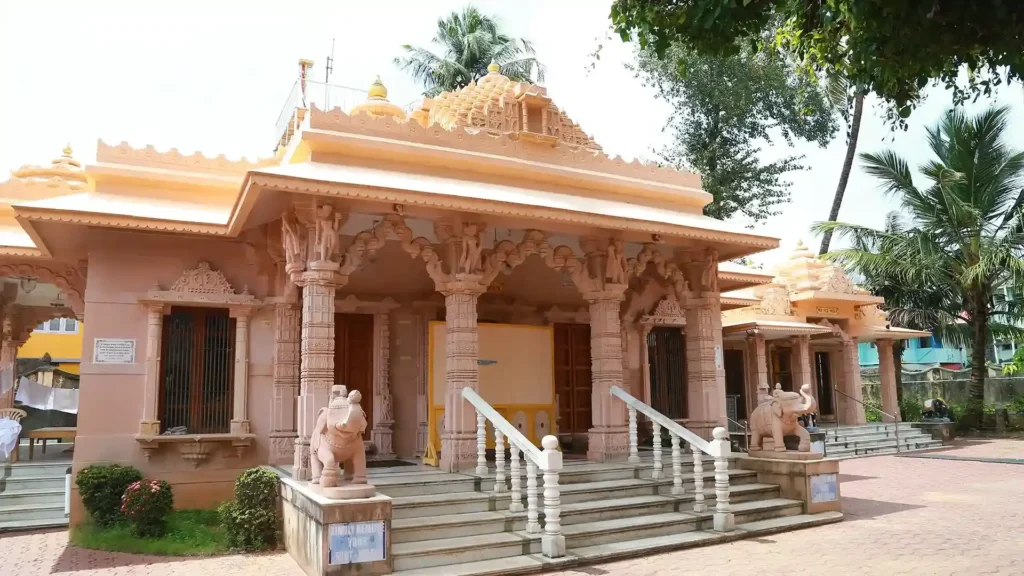SAMAYAK MANDAL
Sri Shankheshwar Parshwanath Samayik Mandal, Cochin is completing a decade, witnessing an upward roll of a great religious wave among its members, with a beat that goes, ‘ Samta’ (endurance).
The motivator for initiating Shri Shankheshwar Parshwanath Samayik Mandal has been Smt. Vimlaben Mansukhbhai Vadalia, with a sole objective of organizing a platform for collective participation in accomplishment of various religious activities. The community that prays together stays together. In the year 1994, during her visit to Mumbai she observed the functioning of Samayik Mandals in many temples. She was inspired to start a similar Mandal in Cochin. On her return to Cochin, she had a word with few ladies of the Sangh. Her holy exuberance, and religious resoluteness, (one of the best evidences of a good conscience), that as soon as she suggested the need for establishing a Mandal, within the God’s abode, the Sangh members hastened to support and with a cheerful manifestation the seed was sown for the blossoming of the Samayik Mandal. With due permission from the Sangh, the Sri Shankheshwar Parshwanath Samayik Mandal, Cochin was inaugurated by the Sri Cochin Sangh on January 8, 1995, by Shri Pravin C. Shah Samayak is the name given to the austerity according to which, after renouncing sinful words, actions and propensities, one turns sinless towards the attainment of spiritual perfection. Samayik is the vow on account of which one can attain calmness, equanimity and a wholesome outlook.
Wearing clean, white dress, sitting on the Katasan (a seat of warm woolen cloth); holding in the hands charvala (a small mop made of woolen threads stuck to a stick) and a muhpatti (a white cloth which is a square of 34 inches like a handkerchief) folded in a specific manner: sitting at a place for 48 minutes in holy recitation, medication, scriptural studies and spiritual reflection. This vow is called Samayik. It is symbol of leading a sainthood life for 48 minutes, by renouncing everything for the time being.
Noble in motive and far-reaching in purpose, the Mandal activities grew multifold. The enthusiasm among the members is so high that most of the days the participation is overwhelming, in fact many of them attend regularly from Ernakulam city without fail. The Good of a person is the active exercise of his/her soul’s faculties in conformity with excellence or virtue. Moreover this activity must occupy a complete lifetime; for one swallow does not make spring, nor does one fine day; and similarly one day or a brief period of happiness does not make a person supremely blessed and blissful. A consistency in activity is a must for spiritual enlightment. The members are aware of this fact thus the Mandal has high regularity in attendance of all its activities.
The success of Samayik Mandal has been greatly because the religious practices are very simple to follow and moreover there is a uniform feeling of harmony and responsiveness between each of the members. The Samayik Mandal has a ‘Samayik’ every Saturday from 10.00AM to 11.00AM apart from ‘PARATHANA’, BHAKTAMAR STOTRA, and also organizing religious events (competitions). Once the Samayik is over every member is customarily given a card of a niyam (pledge) choosen randomly. Once every year a joint endeavor with Snatra Mandal in conducting the Akashan vrata is held. In the supplications and prayers, and other religious practices shri sangh members assist it wholeheartedly.
Samayak Mandal does not follow any kind of hierarchy, for all practical purpose it has seven founding members, for the day-to-day organizational work. Samayak Mandal firmly believes that those that do truly and earnestly repent sins would give charity. The money that is collected from members is donated to a needy community person.
The Mandal today enjoys a membership of hundred and sixty active women members. Ladies belonging to different sects of the community together assemble and perform religious practice in perfect harmony. That is the beauty of Jainism, followers may belong to different school of thought, but the underlining tenets are the same in all. It teaches the virtue to live together as equals; claiming nothing for themselves but what they as freely concede to everyone else; regarding command of any kind as an exceptional necessity, and in all cases a temporary one.
.
This is the day for samta:
Let earth to Heaven draw near;
Lift up thy souls to seek salvation
Entreat together here.

